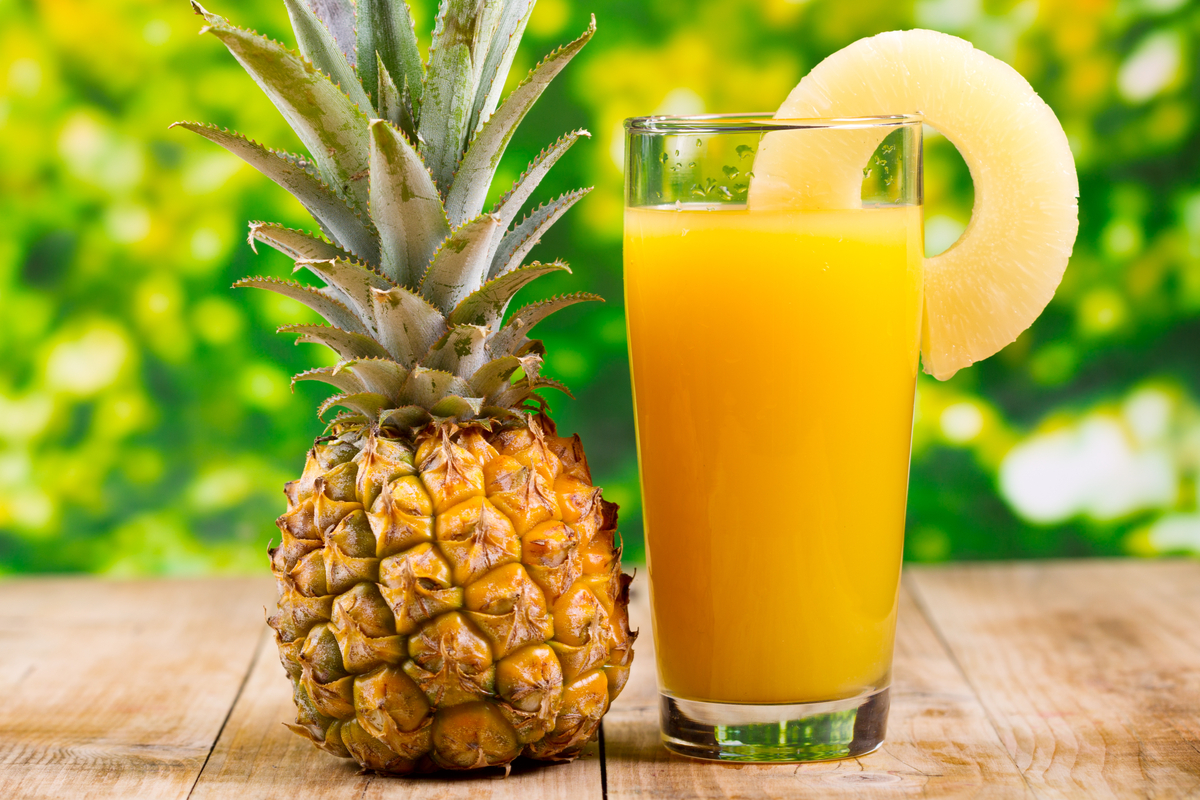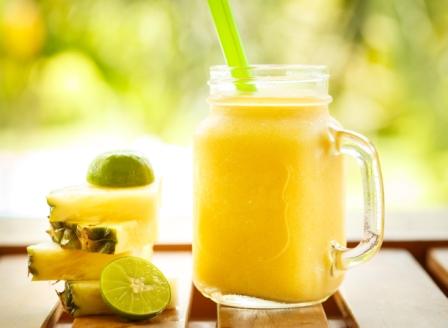Pineapple is rich in vitamins and minerals. It’s also the only major dietary source of bromelain, an enzyme that has been used for centuries to treat a range of ailments. Pineapple juice is also a great way to lose weight!
Did you know for hundreds of years, pineapples were used as a symbol to convey wealth and high status? Today we are fortunate to find sweet ripe pineapples, at our local phalwala and at supermarkets everywhere.
Pineapples are cultivated in warm climates globally. Tropical, vibrant, sweet, tart, it is a delicious way to drink yourself to good health.
Also called ananas in Hindi, pineapples are a regular feature in raitas, chutney, fruit chaats, smoothies and salads.
Pineapple is super rich in vitamins and minerals.
It’s also the only major dietary source of bromelain, an enzyme that has been used for centuries to treat a range of ailments.
Modern research has studied bromelain’s effects and supports several of pineapple’s potential health benefits.
Pineapple juice packs a concentrated amount of these nutrients into a single serving. Because it’s naturally sweet, most pineapple juice contains little to no added sugar.
Pineapple juice is a good source of:
Manganese
Vitamin C
Copper
Vitamin B6
Thiamine (B1)
Beta-carotene and Vitamin A
Pineapple Juice Health Benefits
Immune Booster and Inflammation fighter
Bursting with Vitamin C, pineapple juice helps increase the granulocytes in the blood. Granulocytes – Basophils, Eosinophils, and Neutrophils – are the white blood cells responsible for fighting off viruses and bacteria.
Also, high levels of essential and non-essential amino acids, antioxidants, and Vitamin A in pineapple juice help reduce inflammation.
Great for vision
Regular consumption of pineapple juice means reduced risk of developing cataract and macular degeneration.
Vitamin C and antioxidants present in pineapple counteract opacification of the ocular lens that eventually results in cloudiness and vision loss.
Beta-carotene, Vitamin A, potassium, and manganese fight cell damage that leads to macular degeneration in the elderly.
It is a heart-healthy drink
Include pineapple juice in your diet and your heart will thank you.
Because of its potassium and bromelain content, pineapple prevents blood clotting, eases the tension of the blood vessels, promotes circulation, and improves cardiovascular health.
Pineapple also contains copper, an essential mineral in red blood cell (RBC) formation. RBCs carry oxygen and remove carbon dioxide from the body.
It Regulates Blood Pressure
A high sodium-low potassium diet can lead to hypertension.
Potassium helps you balance the amount of water in your body and maintain blood pressure. And pineapple is among the fruits with the lowest sodium content.
A cup of pineapple juice has about 1 mg sodium and 195 mg potassium. That’s why nutritionists suggest pineapple juice for people with hypertension.
It is cancer protective
Pineapple can offer protection from cancer by acting, literally, as a bolster. Vitamin C, Bromelain, flavonoids, and other antioxidants present in the fruit combat free radicals, but the hero that makes pineapple an anti-cancerous food is manganese.
Manganese is the co-factor involved in the production of superoxide dismutase enzyme that helps to break down free radicals in the body.
Promotes healthy digestion
Have pineapple along with the meal, bromelain may help to breakdown complex proteins. This, in turn, revvs up digestion and reduces bloating or indigestion.
It’s no secret that soluble and insoluble dietary fibre is crucial for digestion. Pineapple juice offers a decent amount of fibre content can keep your gut healthy, preventing constipation, gas build-up, and diarrhoea.
Bromelain also has antibacterial properties that can protect your gut from diarrhoea -causing bacteria like E. coli and reduce gut inflammation.
More research is needed to confirm these digestive effects since studies have focused on the effects of concentrated bromelain higher than the amount found in pineapple juice.
Treats colitis
Some research also suggests that bromelain can reduce the incidence and intensity of colitis and irritable bowel disorder (IBD) in mice.
Consume pineapple juice to decrease the inflammation and swelling in your large intestine and colon.
Helps reduce arthritic conditions
Bromelain seems to help reduce arthritis pain. A study published in Evidence-Based Complement Alternative Medicine looked at 28 subjects with osteoarthritis of the knee. The researchers found that when the subjects were given varying doses of bromelain, they had a significant reduction in soft tissue swelling, pain and/or joint stiffness.
Bromelain reduces inflammation, oedema, and pain by lowering the levels of cytokines and bradykinin, the inflammatory agents.
Supports healthy skin
Pineapple is rich in manganese (about 75% of the RDI per cup). This mineral, along with vitamin C, is required for synthesizing collagen – a structural component of skin that prevents sagging and wrinkles, strengthens joints, and increases skin hydration.
Manganese also functions as an antioxidant to protect skin cells from UV damage.
One more reason to consume pineapple juice especially during summer.
Good for Asthma, Cough, and Sinusitis
Pineapple juice may also be a boon to cure asthma, based on the results of a study done on people suffering from Bronchial asthma. The researchers found that 90 days of consuming pineapple juice has significantly improved the Peak Expiratory Flow Rate (PEFR) value of the subjects. PEFR is the maximum speed of expiration of an individual.
Bromelain can also dilute the mucus and improves expectoration rate. Decongesting the nasal passage is helpful to reduce sinusitis-related cold and cough.
Strengthens the bones
Magnesium and manganese deficiency has direct links with osteoporosis. Since pineapple is a rich source of these minerals, it can improve bone health and prevent osteoporosis.
In fact, the combination of magnesium, manganese, calcium, copper, and zinc can reduce spinal bone loss in post-menopausal women.
Manganese deficiency affects the cartilage and bone development as well. Hence it might be a good idea to lean on a glass of pineapple juice (read: daily) for strong bones.
Prevents signs of ageing
Pineapple juice is rich in vitamin C and beta-carotene. You’re probably well aware that Vitamin C not only boosts immunity but repairs tissues, promotes collagen synthesis, acts as an antioxidant, and protects skin against premature ageing.
Helps you lose weight
Pineapple juice may also have a good effect on your waistline: with no unhealthy fat, low calorie, and lots of water, it is an excellent drink to stay fit. It also contains a good amount of fibre and Vitamin C
Less vitamin C in circulation is said to increase body fat and waist size.
Include fresh pineapple or pineapple juice in the meals if you are low on Vitamin C. One cup of pineapple meets more than 100% of your RDI for Vitamin C.
Helps to detoxify the body and mind
Because it is loaded with antioxidants and proteolytic enzyme (breaks down proteins)– Bromelain, pineapple juice is a good detox drink.
Pineapple has a long-standing history as a digestive aid, a potent cleanser that alkalizes the body, and boosts metabolism.
Strengthens your gums
Dentists recommend consuming fresh pineapple or pineapple juice a few days prior to and after dental surgery to prevent swelling, bruising, and inflammation. Bromelain and Vitamins C and K reduce inflammation and help with wound healing. The astringents present in pineapple can tighten up gum tissues and even fix teeth loosening or retracted gums.
Bromelain can remove stains and break up plaque. In addition, the manganese in pineapple promotes overall oral health.
Can Diabetic People Consume Pineapple Juice?
Being diabetic doesn’t mean you should shy away from pineapple juice. Rich in fibre and vitamins, one cup of fresh pineapple contains about 2.3 grams of fibre, almost 99% insoluble. Insoluble fibres, in fact, are known for reducing the risk of Type 2 Diabetes.
Considering pineapple’s GI (Glycemic Index) ranking of approximately 55, the word here is ‘moderation’.
Beware of Bromelain allergy
- Go easy if you’re allergic to wheat, celery, papaya or latex because you might be allergic to bromelain too.
- Bromelain can cause mild headaches to skin rash, flatulence, diarrhoea, and nausea in certain individuals.
- While pineapple is good for people with ulcerative colitis, those with stomach ulcers shouldn’t consume pineapple.
- Pineapple juice may increase the risk of bleeding in people who are on blood thinners.
- Pineapple is also said to enhance the effects of antibiotics, which is harmful to the body.
It’s easy to make pineapple juice at home. Just be sure to use a fully ripened pineapple because it can be toxic when consumed raw.
Recipe:
Note: Using canned, sweetened pineapple juice is a definite no-no!
I fresh Pineapple (skinned and cut)
Optional additions (use any one or two at best):
- A bunch of mint
- 1’’ piece ginger
- 1tblsp. apple cider vinegar
- 2 sprigs celery
- Small bunch of baby or big spinach
- 1 lime/ lemon
Method:
Blend the pineapple slices and add variations if you desire.
Drink it fresh (try to keep the fibre quotient by not straining the juice)
Nutrition Information
A 1 cup serving of unsweetened pineapple juice contains:
Calories: 133
Protein: 0 grams
Fat: 0 grams
Carbohydrates: 32 grams
Fibre: 1 gram
Sugar: 25 grams
To sum things up, pineapple juice is undoubtedly delicious, nutritious and offers many health benefits. And, consuming it in moderation is the key to good health. Its best to ask your doctor before adding to or cutting out things from your diet.
References:
http://www.ijsrp.org/research-paper-0115/ijsrp-p3743.pdf
https://www.ncbi.nlm.nih.gov/pmc/articles/PMC538506/









